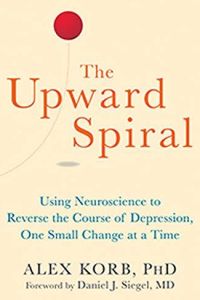Rejoignez getAbstract pour lire le résumé !

Rejoignez getAbstract pour lire le résumé !
Alex Korb
The Upward Spiral
Using Neuroscience to Reverse the Course of Depression, One Small Change at a Time
New Harbinger, 2015
Aperçu
A neuroscientist offers sound tactics for coping with, minimizing and warding off depression.
Recommendation
Neuroscientist Alex Korb, PhD, explains why yoga, socializing and showing gratitude – plus good sleep, exercise and better habits – matter. He describes in detail how your brain and body communicate and how your body releases neurotransmitters like endorphins, dopamine and oxytocin when you take positive actions to reduce stress, improve your mood and fight depression. While never giving medical advice, getAbstract finds that Korb’s book will be especially useful for people that are new to the topic.
Summary
About the Author
Neuroscientist Alex Korb, PhD, has made an academic and professional career out of understanding depression and the techniques and tools anyone can use to avoid or reverse it. His expertise extends into leadership and motivation, mindfulness, physical fitness, and even stand-up comedy.



















Comment on this summary